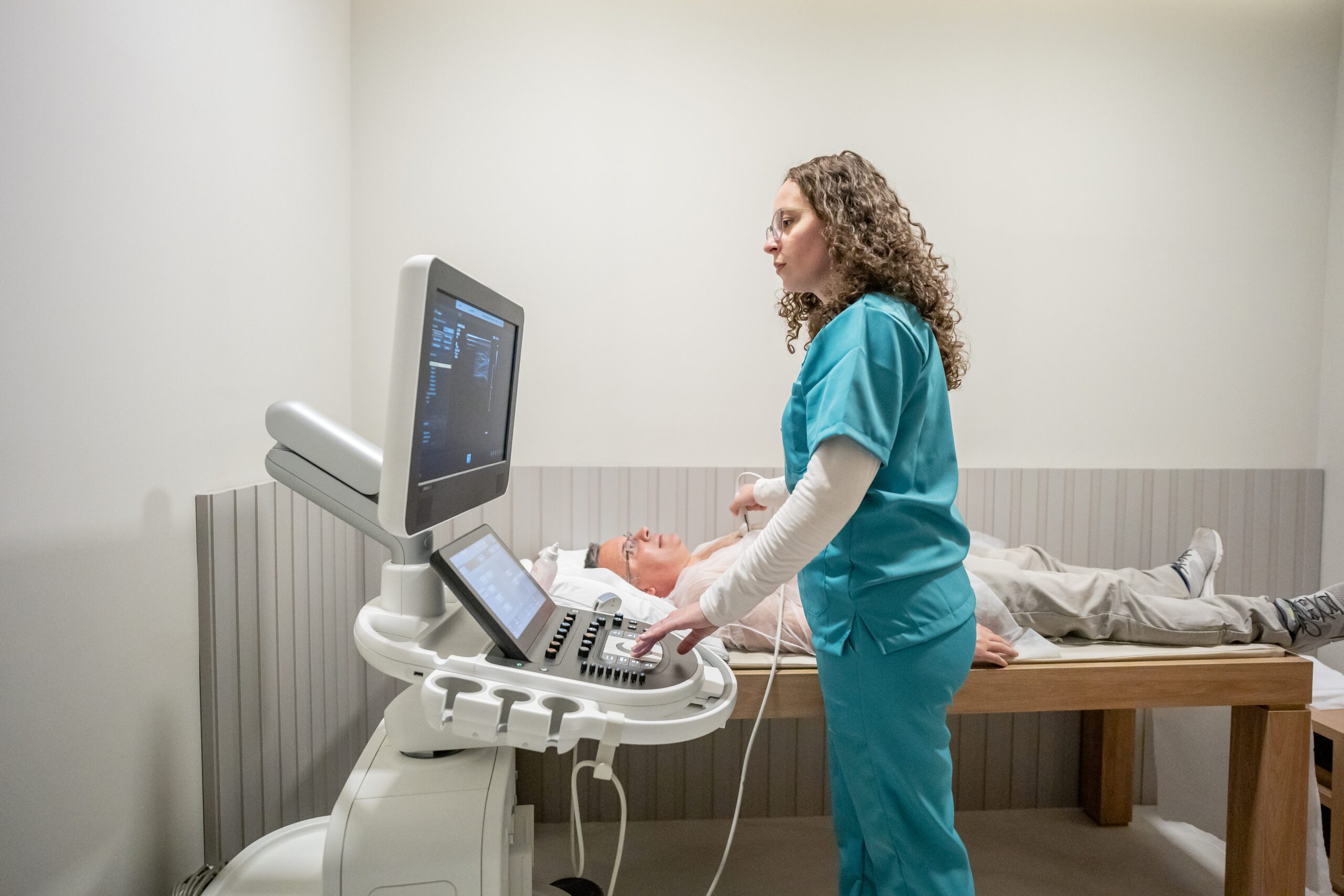Justine Falcone and Patrick Curtin contributed to this post.
When under the care of a physician, receiving treatment in the ER, or establishing care with a PCP, most people don’t ask the physician what degree they have. In fact, many non-medical people and patients are entirely unaware that in the US there are two different medical degrees, MD and DO, and two different paths to becoming a physician.
By contrast, the DO vs. MD distinction is something many prospective medical students wonder about. To clear up any questions you may have about the two paths, in this blog we’ll answer some common questions about DO vs. MD degrees.
Here are the major differences (and similarities) between them.
DO vs. MD: the Differences and Similarities
DO vs. MD: The Differences
The major difference between an MD (trained at an allopathic medical school) and a DO (trained at an osteopathic medical school) is philosophical.
MDs are taught to analyze, treat, and prevent specific medical conditions. DOs share this education, but tend to analyze the patient with a more “holistic approach.” They also utilize different physical exam/treatment techniques, namely osteopathic manipulative medicine (OMM), aka. osteopathic manipulative treatment (OMT).
Another major difference in philosophies can arise from residency training. There are both allopathic and osteopathic residency training programs. DOs can apply to allopathic residency training programs, but osteopathic training programs will have a larger focus on both holistic approaches to patient care and OMM.
DO vs. MD: The Similarities
The similarities between MDs and DOs are growing as more and more DOs enter the workforce. Both MDs and DOs are physicians who can apply for allopathic residencies, write prescriptions, treat patients, and perform procedures assuming they are credentialed in that medical subspecialty. In short, both are medical doctors who share the fundamental job requirements and responsibilities that society expects of a physician.
FAQs: The Stats, Histories, and Myths
Can DOs write prescriptions?
Yes, DOs can write prescriptions.
Can DOs work as surgeons?
Yes, DOs can work as surgeons.
Why are there fewer DOs than MDs in the US?
From a pure numerical standpoint, there are fewer osteopathic (DO) medical schools and applicants than allopathic (MD) applicants and medical schools. However, in recent years, there is an increase in applicants in both MD and DO fields.
What is the history of the MD?
The first allopathic medical school to open in the USA was College of Philadelphia in 1765, later becoming the University of Pennsylvania’s Perelman School of Medicine. As more medical schools were formed, different administrative bodies like the American Medical Association (AMA) and the Association of American Medical Colleges (AAMC) were formed to help standardize education across schools.
What is the history of the DO?
Osteopathic medicine in the United States was formed by Andrew Taylor Still in 1874. Due to the large amount of unregulated medications and highly morbid surgeries of the time, osteopathic medicine was an attempt to renew a focus on the patient as a whole.
Are there any myths about MDs?
A common myth about MDs is that they only care about diseases and not the entire patient.
Are there any myths about DOs?
A common myth about DOs is that they’re unable to do what MD doctors do. They’re able to apply to, and have access to, many of the same residencies, with a similar foundation of training.
All About DO vs. MD Medical School Admissions
Regardless of whether a medical school is osteopathic or allopathic, the admissions process is fairly similar. While the DO vs. MD application servers vary (AMCAS vs. AACOMAS), the requirements for admission into a DO or MD program are pretty standard. Both require a BA/BS undergraduate degree, completion of the core prerequisite courses (may vary among institutions but usually includes general chemistry, general biology, organic, etc.), volunteer/extracurricular activities, good grades, MCAT scores, and good leadership qualities. .
Are there differences in GPAs for DO vs. MD applicants?
The mean overall GPA for osteopathic/DO applicants in 2018 according to AACOM was 3.43 (science 3.43, non-science 3.65).
The mean overall GPA for allopathic/MD applicants in 2018 was 3.55 (science 3.47, non-science 3.71) according to the AAMC.
Are there differences in MCAT scores for DO vs. MD students?
With recent changes in MCAT scoring, there is not an abundance of data on new MCAT scores for DO vs. MD students. Older studies with the prior MCAT scoring system found MDs had higher average scores than DOs. It is important to realize that individuals in both fields can do extremely well with the right preparation.
The mean MCAT score for applicants to osteopathic schools in 2018 was 25.62 (old MCAT) and 503.83 (new MCAT).
The mean MCAT for accepted applicants to allopathic programs was 511.2. The mean MCAT for accepted applicants to osteopathic programs was 503.1 (2018-2019).
Is it easier to get into DO or MD programs?
See above, but both MD and DO schools are competitive, with key academic requirements that must be met prior to application.
If I’m considering a DO program, do I need a letter of recommendation from a DO?
Letters of recommendation are important for both DO and MD applicants. If you’re considering a DO program, it would be important to know why you want to apply. Working under someone who has walked the path you are set to embark on is valuable not just for applications, but for understanding and refining the motives for your career choice.
Is shadowing a doctor required if I’m considering a DO program?
Different programs will say if shadowing is suggested, encouraged, or required. The more experience you can get in the field you’re applying to, the more competitive and genuine your application will feel.
Most programs, regardless of MD or DO, want to see that students have shadowed a physician. In particular, most DO programs require applicants to have shadowed DO physicians specifically. Prospective students are perfectly able to apply to both MD and DO programs (and many do).
What are the differences in personal statements for MD (AMCAS) programs vs. DO (AACOMAS) programs?
Despite their many similarities, there are philosophical differences in training between MD and DO programs. Being able to articulate why you want to be a doctor is important, but it carries more weight when that answer can be supported by specific life, volunteering, or educational opportunities so they know you can “talk the talk, and walk the walk.” Given that MD and DO programs have different training models, speaking from personal experience and what you would do with that specific training shows that as an applicant you know what you’re signing up for.
DO vs. MD: The Similarities and Differences in Medical School
Medical School Curriculum
Medical school teaches us to be well-rounded, competent physicians regardless of the degree earned. Therefore, all US medical students, whether allopathic or osteopathic, will take the core basic science courses (biochemistry, immunology, cardiology, etc.) and have anatomy labs.
However, the structure of these courses tends to vary widely among institutions regardless of the degree program (e.g., the amount of small group learning, clinical experience in the first two years, lecture style, testing, grading system, etc.).
The last two years of medical school involve clinical rotations in hospitals/clinics. One of the differences between MD and DO programs is that DO programs incorporate a type of teaching known as osteopathic manipulative medicine (OMM) that will be ingrained throughout the curriculum.
That being said, there are many differences in training environments, resources, and teaching styles within each MD and DO program, so finding the right fit is a very personal decision that doesn’t easily boil down to a DO vs. MD thing.
Program Duration
There’s no difference in program duration, however the classic four-year track of medical training is changing. Many students are taking research or gap years to figure out what medical subspecialty they want to apply to, or to make themselves more competitive in a chosen field.
Specialty Selection
As a generalization, there are fewer DO surgeons. A large part of this is there are fewer DOs than MDs, but also OMM and holistic medicine tend to gravitate more easily to medical specialties than surgical. There is an exception to every rule, and if you look at any specialty there is bound to be a DO somewhere in the country in that field.
COMLEX vs USMLE
MD students take the USMLE exams (Steps 1, 2, and 3) to earn their degree. While DO students may also take these exams, they’re required to take separate board exams known as the COMLEX exams (Levels 1, 2, and 3) in order to earn their DO degree.
Many DO students elect to also take the USMLE exams in order to make themselves more competitive/comparable to MD applicants for residency programs, although this is not often required by most residency programs.
Licensing Exams
Very generally speaking, MD licensing exams fall under the USMLE while DO licensing exams are run by the NBOME. MD programs take Step exams, while DO programs take COMLEX-USA.
DO vs. MD: Residency and Post-Medical School Training
After graduating medical school, all graduates, regardless of their MD or DO degree, must complete a residency program in their choice of specialty in order to become board certified in their field and ultimately practice medicine unsupervised.
DO and MD students ultimately have the same opportunities when it comes to choosing their career path and specialty (such as becoming a surgeon, OB/GYN, family medicine doc, psychiatrist, etc.). While some residency programs only accept one degree (such as a few osteopathic residency programs) or historically tend to accept one type of degree, most US medical residency programs accept applications, and ultimately match, both DO and MD applicants. In general, a candidate’s qualifications (such as board scores, research experiences, medical school grades, and letters of recommendation), carry much more weight than one’s degree when it comes to matching into a residency program.
What are the differences between MD and DO residency programs?
The largest differences depend on what type of residency you do. DO residency programs will still have a focus on OMM but otherwise will focus on the specialty of medicine in which they are being trained.
Are there differences in match rates for DOs vs. MDs?
The difference in match rates for DOs vs. MDs depends on the field. Like anything, more competitive specialties are harder to match into but in so far as matching into something, there is a home for both MD and DO applicants.
Are there salary differences for DOs vs. MDs?
Salary differences between MDs and DOs are dependent on specialty, not on the type of medical degree.
Are there any restrictions for DOs or MDs when it comes to practicing medicine internationally?
Whether MDs and DOs can practice medicine internationally is dependent on the country in question, as there is no set guideline that applies to all countries.
DO vs. MD: Deciding Which is Right For You
Is it easier to become a DO than an MD?
Both MD and DO fields require extensive undergraduate or postgraduate classes to build the necessary foundation to apply. Both fields are competitive in their own right. It’s not so much that one is easier, they are different. Although there is overlap, the applicant pools are not identical given that training philosophies and projected fields after graduation are different depending on if a student chooses the DO. vs. MD path.
Is a DO “less prestigious” than an MD?
There is certainly some stigma within the medical community when it comes to DOs vs. MDs. In my personal opinion, it comes from misinformation as MD programs are generally less familiar with DO training while DO programs are aware of both. DO degrees allow DOs to do all of the key job requirements within their medical specialty of training. Many patients would not be able to tell the difference between a DO vs. MD physician unless they’re told or they see it on a name card.
If I change my mind, can a DO degree be converted into an MD degree?
Unfortunately no, each degree is isolated and would require a reapplication to medical school.
How do I decide which path is right for me?
Ask for advice! Poll both MD and DO physicians, talk to your medical advisors at undergrad/grad school, and find where you feel most “at home.” You may also consider a one-time planning session or working with one of our admissions consultants. At the end of the day, this is the start of a beautiful career and either path will get you far. The choice largely comes from philosophical differences in training and specialty goals.
The Bottom Line
At the end of the day, a medical school graduate is a physician, regardless of the MD or DO title. Choose the path that makes sense for you! And reach out to us if you have any questions. Good luck on your journey!
Interested in learning more about a career in osteopathic or allopathic medicine or how to apply to these programs? Check out the following osteopathic and allopathic programs.
Or, check out these other (free!) posts on the Blueprint Med School blog!





